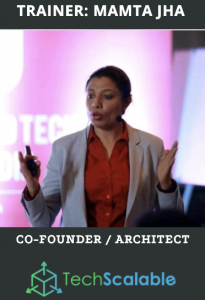Online Instructor-Led Certification BootCamp
Docker Certified Associate (DCA)
This course is designed to equip you with an in-depth understanding of Docker the most adopted container technology. The course is designed absolutely from scratch and provides hands-on exercises for you to experience the nitty-gritty of working with containers in production level.
This course is a perfect fit for aspirants who wish to be a Docker Certified Associate (DCA).
- Docker Container
- Images and Registry
- Docker Networking
- Container Orchestration with Docker Swarm
- Working with Docker Enterprise features
- Container Storage and volumes
- Container Security
- Want to be a Docker Certified Associate (DCA)
- Want to learn Docker containers from scratch
- Want to understand how Docker works in production level
- Want to understand Docker Networking and Swarm Cluster in depth
Day 1:
Chapter 1: Introduction to Container
- Introduction to Containers
- Kernel features – CGroups and Namespace
- Types of Containers
- VMs vs Containers
- Installing Docker
- Learning basic Docker commands
- Attached and Detached Modes
- Docker port binding
- Container Lifecycle
- Container Port mapping
Lab: Docker installation and basic docker commands
Lab: Launching container with Ubuntu image from Docker hub public images
Chapter 2: Docker Images and Public Registry
- Introduction to Docker Hub
- Introduction to Docker images
- Create/Push an Image
- Tagging image
- Image Layering
- Storage Drivers
- Inspecting and Pruning Images
Lab: Working with Docker Images
Chapter 3: Docker Private Registry
- Tagging images
- Committing changes
- Deploying and configuring private Registry
- Push/Pull images with Registry
Lab: Creating a private Docker registry for Docker containers
Chapter 4: Building Docker Image
- Dockerfile introduction
- Automating Image build using Dockerfile
- RUN Instruction
- FROM Instruction
- CMD, ENTRYPOINT, EXPOSE, VOLUME
- COPY, ENV and much more..
Lab: Building a Dockerfile to set up an Ubuntu container with the WordPress application
Day 2:
Chapter 5: Docker Networking
- Overview of Docker Networking
- Understanding Bridge Networking
- Implementing User-Defined Bridge Network
- Understanding Host Networking
- Understanding None type of Networking
- Multi container networking
- Understanding use-case and need for various networking types
Lab: Creating containers with Bridge type network
Lab: Implementing Host networking
Lab: Demonstrating None type of network
Lab: Implementing multi-container connectivity with user-defined bridge networks
Chapter 6: Docker Storage and Volumes
- Persistency in containers
- Overview of Storage Drivers
- Understanding Bind mount and tmpfs mount
- Overview of Docker Volumes
- Implementing Docker Volumes
- Understanding use-case and need for various storage types
Lab: Working with a container and implementing bind mount
Lab: Working with a container and implementing tmpfs mount
Lab: Working with a container and implementing Volume mount
Chapter 7: Container Orchestration with Docker Swarm
- Overview of Container Orchestration
- Understanding Swarm Architecture
- Understanding the role of Manager Node
- Understanding the role of Worker Node
- Services: Replicated and Global
- Understanding tasks
- Working with Docker Compose
- Converting application deployment into Stack
Lab: Setting up Swarm 3 node cluster
Lab: Deploying an application as Global services in Swarm Cluster
Lab: Deploying an application as Replicated services in Swarm Cluster
Lab: Scaling application in Swarm Cluster
Lab: Deploying Application stack in Swarm Cluster
Day 3:
Chapter 8: Docker Swarm Networking
- Understanding Swarm Networking
- Overlay and MacVLAN network
- Mesh Network and Load Balancing
- Publishing ports
Lab: Implementing overlay networking and deploying services
Chapter 9: Working with Docker Enterprise
- Overview of Docker Enterprise
- Universal Control Plane
- Access Control with UCP
- Docker Trusted Registry
- Configuring Trusted CA and Pushing Images to DTR
- Backup DTR and UCP
Lab: Installing Docker Enterprise Edition
Lab: Installing Docker UCP and creating services with UCP
Lab: Creating and Managing Users and Teams
Lab: Installing Docker Trusted Registry (DTR) and integrating with UCP
Lab: Configuring Trusted CA and Pushing Images to DTR
Lab: Backing up Swarm cluster, DTR and UCP
Chapter 10: Security
- Overview of Container security Scan
- Docker Content Trust
- Default Docker Engine Security
- Securing the Docker Daemon
- Docker MTLS
Lab: Configuring Image Scan with DTR
Basic understanding of Linux commands.
- Operating System – macOS, Windows 7 or above
- Putty software to setup SSH connection

Mamta Jha – Co-founder, TechScalable
A Cloud Solution Architect with 15+ years of experience in training and consulting experience, has delivered training to corporates like Microsoft, Intuit, RedHat, VMware, HCL, GE, Applied Materials, Dell, Infosys, IBM, Schneider, L&T, TCS, Capgemini, Accenture, Hexaware, PWC, Wipro, Mindtree etc. to name a few. She is certified and delivers trainings in below technologies:
- Azure and Google Cloud
- DevOps: Git, Jenkins, Ansible, Chef, SonarQube, Artifacts, CI/CD pipeline
- Docker and Kubernetes
- RedHat OpenShift
- RedHat OpenStack
- Machine Learning and Artificial Intelligence
Mamta has worked in various production-level projects and has hands-on experience in architecting and implementing solutions.
- Worked on various migration projects, wherein migrated from on-prem to AWS/GCP/Azure
- Setup Containerised environment for high performance and availability on-prem and Cloud using OpenShift/Kubernetes
- Projects implementing CI/CD pipeline for all environments and automating all stages of software development phases using various DevOps tools
- Designed and implemented auto-healed, high available cluster using Azure Kubernetes Service / DigitalOcean Kubernetes Service/ Google Kubernetes Engine
- Hands-on experience in provisioning and maintaining large OpenStack setup for telecom domain
- Designing and implementing predictive analytical methods and/or applications and performing statistical analysis, data mining and retrieval processes on a large amount of data to identify trends, figures and other relevant information
A project will be provided and we will have Q&A after a week of the training.
In case the batch is cancelled, the amount would be credited back to the payee’s account in 5 working days.
